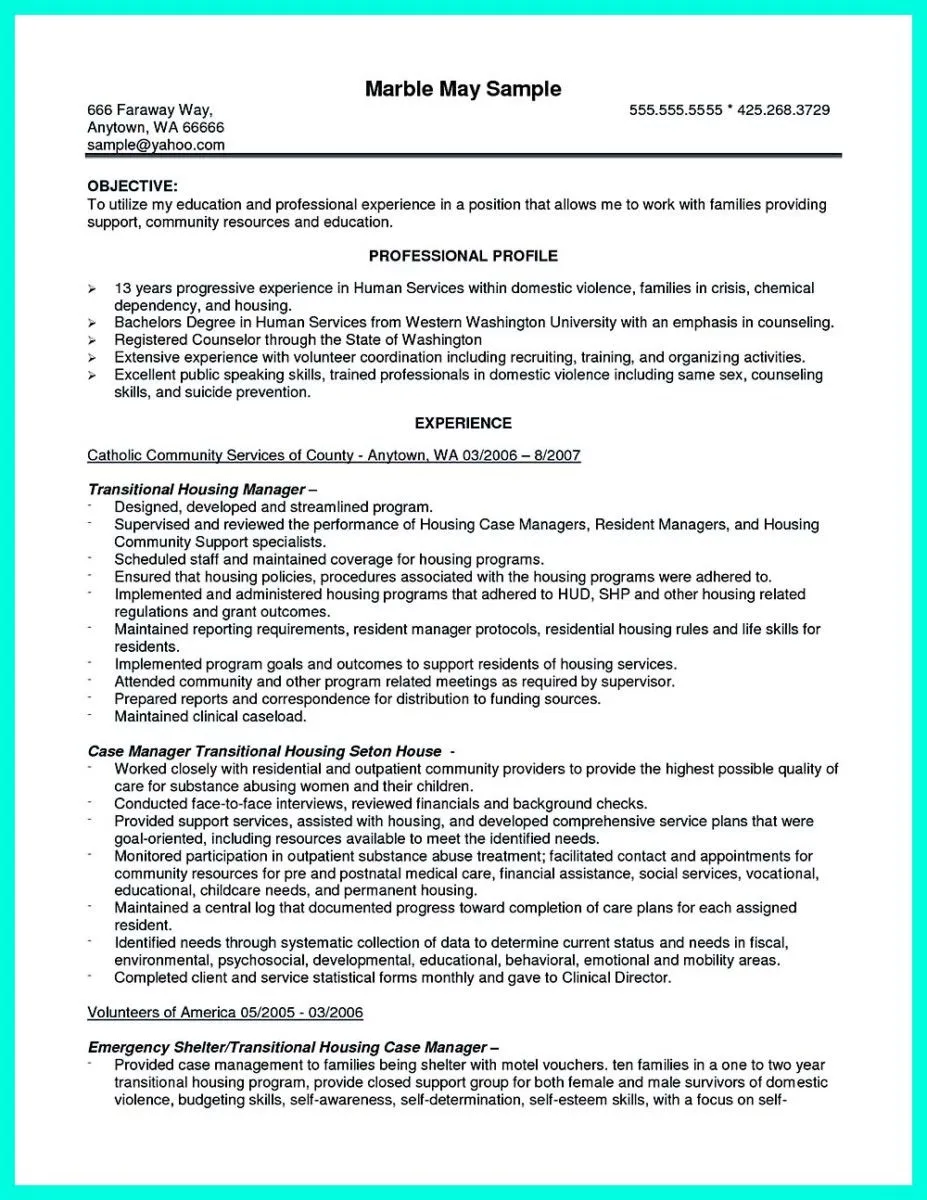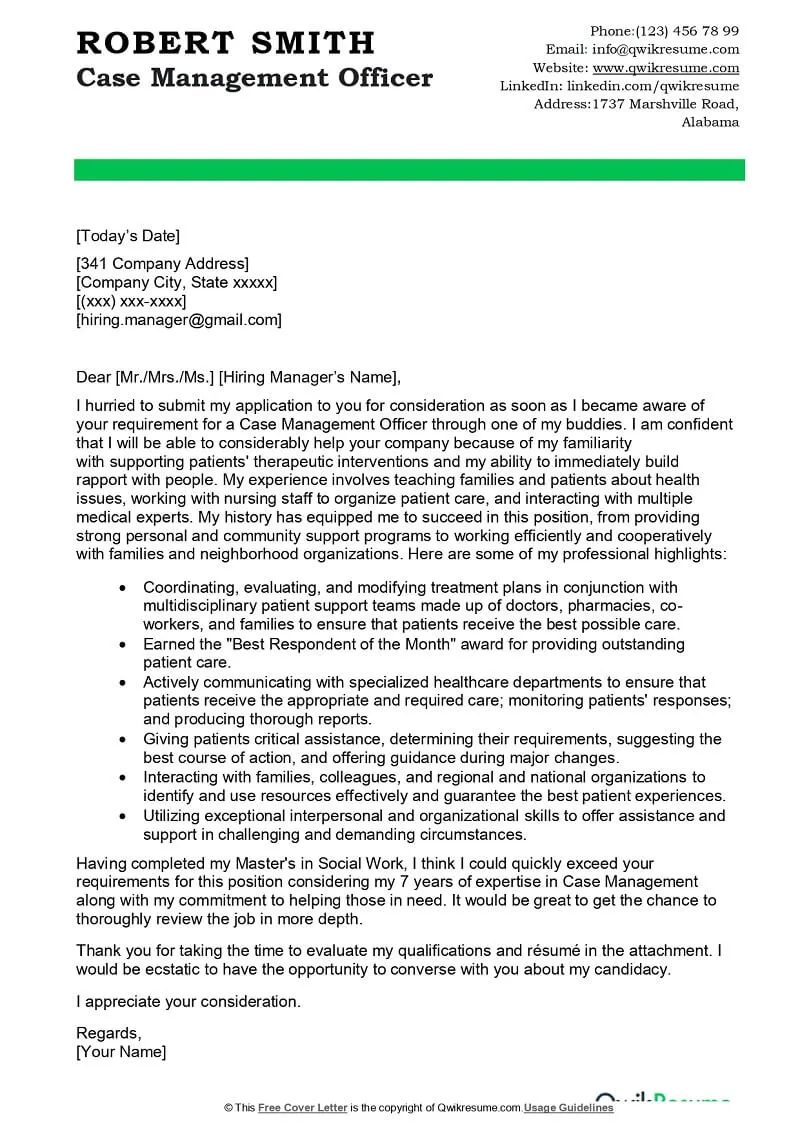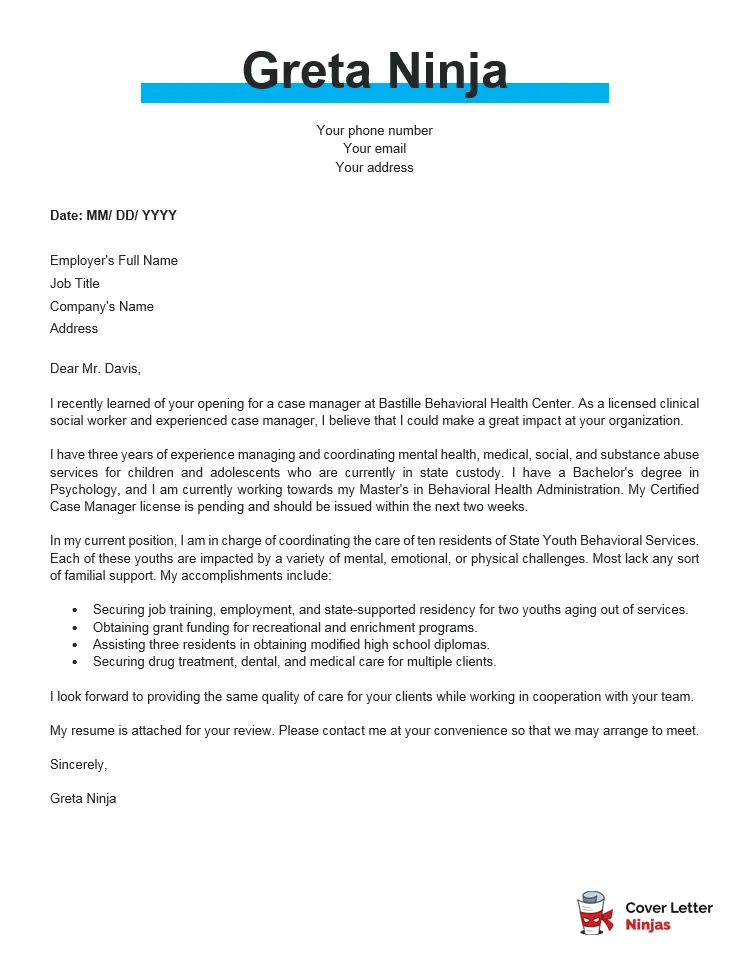Crafting a Compelling Cover Letter
A cover letter is your first introduction to a potential employer, serving as a crucial tool in your job application. For a Case Manager position, your cover letter needs to be carefully crafted to highlight your skills, experience, and passion for helping others. It should go beyond simply restating your resume; instead, it should tell a story. Begin by addressing the hiring manager by name if possible, demonstrating that you’ve taken the time to research the organization. Clearly state the position you are applying for, and immediately capture their attention with a strong opening statement. This could involve highlighting a relevant accomplishment or expressing your enthusiasm for the role and the organization’s mission. Remember, your cover letter is your chance to make a memorable first impression and convince the employer to read your resume.
Highlighting Relevant Skills for Case Management
Case management requires a unique blend of skills, so be sure to highlight the ones most relevant to the job description. These typically include communication, empathy, problem-solving, organizational skills, and critical thinking. Mention your ability to build rapport with clients, assess their needs, and develop individualized care plans. If the job description emphasizes specific software or systems, such as electronic health records (EHR) systems, be sure to include your proficiency. Furthermore, emphasize your interpersonal skills, such as active listening and conflict resolution. Provide examples of how you have successfully applied these skills in previous roles. For instance, you might describe how you facilitated a difficult conversation between a client and their family, or how you successfully navigated a complex bureaucratic system to obtain necessary resources for a client.
Demonstrating Experience Effectively

When detailing your experience, go beyond simply listing job duties. Instead, describe your responsibilities and the impact you made in each role. Quantify your achievements whenever possible. For example, instead of saying “Managed a caseload of clients,” you could say “Managed a caseload of 50 clients, resulting in a 15% increase in client satisfaction.” Provide specific examples of challenging situations you have faced and how you successfully resolved them. Mention any experience you have working with diverse populations or specific client demographics. Tailor your descriptions to match the specific requirements mentioned in the job description. Use action verbs, such as “coordinated,” “managed,” “advocated,” and “assessed,” to paint a clear picture of your abilities. Your goal is to provide concrete evidence of your capabilities and convince the employer that you are a strong fit for the position.
Tailoring Your Cover Letter to the Job Description
The best cover letters are tailored to the specific job you are applying for. Before you start writing, carefully read the job description and identify the key requirements, skills, and qualifications. Use the job description as a guide to structure your cover letter, highlighting the experience and skills that align with the employer’s needs. Use keywords and phrases from the job description throughout your letter. This ensures that your application is easily noticed by applicant tracking systems (ATS). Demonstrate that you understand the organization’s mission, values, and the specific challenges of the role. Research the organization and mention any specific projects or initiatives that resonate with you. By showing a genuine interest in the position and the organization, you will make your cover letter stand out from the generic ones.
Showcasing Achievements and Quantifiable Results
Employers are interested in what you have accomplished in previous roles. Quantify your achievements by providing measurable results. Instead of saying “Improved client outcomes,” state “Improved client outcomes by 20% by implementing a new care plan.” Mention any awards, recognition, or positive feedback you have received. For instance, describe how you reduced costs, improved efficiency, or increased client satisfaction. Use data and statistics to support your claims. If you were involved in a project, detail the specific steps you took and the results you achieved. This data provides concrete evidence of your skills and experience, making your cover letter more compelling. Highlighting your achievements also demonstrates your value to the employer and increases your chances of getting an interview.
Formatting and Structure for a Professional Look

The formatting and structure of your cover letter are just as important as its content. Ensure your letter is well-organized, easy to read, and visually appealing. Use a professional font, such as Times New Roman, Arial, or Calibri, and maintain a consistent font size. Keep your letter concise, ideally one page, and use clear headings and subheadings to break up the text. Use bullet points to highlight key skills and achievements. Pay attention to the layout, including margins, spacing, and alignment. Proofread your letter carefully to eliminate any grammatical errors or typos. Include your contact information at the top of the letter, including your phone number and email address. A well-formatted cover letter demonstrates your attention to detail and professionalism, creating a positive first impression and increasing the likelihood that your application will be taken seriously.
Proofreading and Editing for Perfection
Before submitting your cover letter, take the time to proofread it carefully. Check for any grammatical errors, spelling mistakes, or typos. Read your letter aloud to catch any awkward phrasing or sentence structure issues. Ask a friend, family member, or career counselor to review your cover letter for feedback. A fresh pair of eyes can often identify errors that you might have missed. Pay close attention to the tone of your letter. Ensure that it is professional, positive, and enthusiastic. Make sure the letter flows logically and is easy to understand. Your cover letter is a reflection of your attention to detail, and any errors can negatively impact your chances of getting an interview. By taking the time to proofread and edit, you increase your chances of making a strong impression and landing your dream job as a Case Manager.
